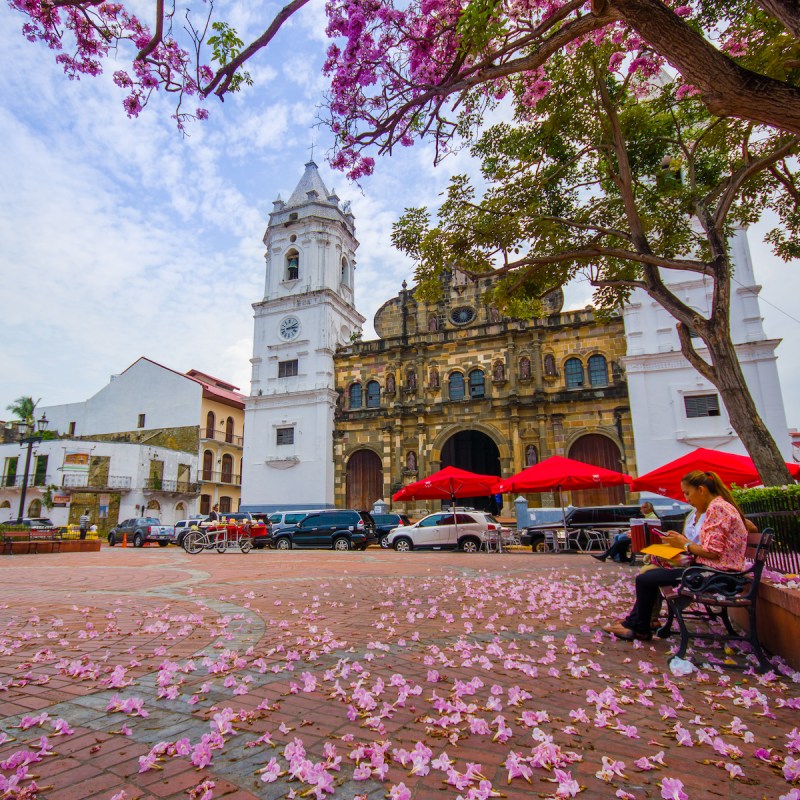
In Panama, you can experience a desert, beaches on both the Caribbean Sea and Pacific Ocean, rainforests, and a major cosmopolitan city. In size, this Central American country is a little bigger than Ireland and a little smaller than South Carolina. More than four million people call Panama home. The weather, location, and cost of living are just a few of the reasons people move here in retirement.
Videos by TravelAwaits
Moving abroad is not a simple task. We asked our Panama expats about common mistakes they and others have made in the hopes other retirees can learn from them.

1. Not Having A Primary Care Physician
A mistake Hunter Schultz says he and others have made is not finding a primary care physician (PCP) in Panama. Schultz says more expats are concerned about the right healthcare instead of the right doctor.
You’ll want to find a PCP because they have localized knowledge about health issues not found on “Dr. Google” or “Nurse Facebook.” These medical experts can identify a bug or systemic issue the physician community is dealing with; and not always in the news media, either. A PCP can help you determine the best place to live based on your health conditions.
You may also need help knowing the best places for advanced or emergency care. “I’ve written about visiting the local ambulance before renting or buying,” said Schultz. “PCPs can help determine their status, and it may affect where you rent or buy.”
PCPs can help with expat mental health issues. There are a lot of hidden stressors when becoming an expat. More often than one might think, PCPs can help navigate some of them.
2. Not Factoring In Additional Expenses
As an 11-year expat living in Panama, Janet Sussman has learned some lessons along the way. While she loves Panama, she recognizes it’s not for everyone. Panama’s cost of living is lower than the U.S., but Sussman recommends factoring in more than just rent and utilities.
Here are some other things she says you need to consider:
- Distance and cost of visiting home
- Quality, convenience, and cost of healthcare
- Difficulty and cost of getting a mortgage
- Acquiring residency, driver’s license, and work permit
- Opening a bank account, fees, and limits for ATM withdrawals or transferring funds
- Starting a business for foreigners
- Labor laws and costs for hiring help
- Buying a car or relying on local transportation
Pro Tip: Sussman also said to be prepared for power outages with solar, USB, rechargeable, and battery-operated devices.

3. Expecting The Same Food At The Same Price
While David Gibb is not an expat yet, he has visited, researched, and talked to other Panama expats about mistakes they’ve made. Many expats enjoy healthy, quality meals in Panama for less than $10 a day. But that’s only if you can leave your expensive North American eating habits and vices behind and eat like a local! Many of your favorites from back home will be prohibitively expensive or simply not available here. The cost of imported goodies will burn through your nest egg faster than a wildfire.
Love root beer? You’re outta luck. Horseradish for your roast beef? Fuhgeddaboutit! A bottle of Heinz 57 sauce costs a whopping $10, and so will hummus. Good luck finding baby spinach (unless you can handle the mushy, frozen kind), cherries, chili powder, or grits — you’d need Sherlock Holmes to track them down. And if you enjoy sweets like Mars Bars, Heath Bars, Coffee Crisp, Cadbury mini eggs, licorice, or wine gummies, you’ll have to jump on a plane to satisfy your decadent cravings.
But if you learn to cook and dine like a local, you’ll reap the benefits. Hit a local “fonda” in the morning to enjoy ham and eggs for $2.50 — or a ham, egg, and cheese croissant for $2.25. A 14-inch, three-topping pizza will only set you back $6. And a quarter-chicken dinner plate with coleslaw and a drink is just $4.50 at the local truck stop. Rice and beans with barbecue chicken or sea bass is $4.75. Eggs are still about $2.40 a dozen, whole cooked chicken is $5.50, pineapples are $1–$2 (depending upon their size), and bananas are just 15 cents each.
For those things you can’t do without, Gibbs suggests making it yourself.
“I know someone who found a recipe hack for Heinz 57 sauce online and now mixes her own,” he said. “Same for chili powder and vanilla coffee creamer.”
4. Bringing Too Much Stuff
Expat Anne-Michelle Wand strongly recommends thinking about what you are shipping to your new home. She says less is better.
“I always recommend bringing only those essentials you can’t live without and items of sentimental value,” says Wand. “Most things like furniture, appliances, silverware, even cars can be gotten here.”
Sussman agrees. She says you might pay a fortune to ship your “must-haves” only to find out that you didn’t need most of them, they won’t last in this climate, or, even worse, Panama is not for you and you have to ship them back.

5. Unrealistic Expectations
There is undoubtedly a certain mystique, wonder, and romantic notion about living abroad and setting down roots outside your home country. Expat Joyce Barr says for some new expats, once they land in their newly adopted home and begin to realize just how different things really are, a buyer’s remorse of sorts begins to kick in.
To avoid this, Barr recommends spending plenty of time in your intended country beforehand. Visit for at least 10–14 days each trip, with at least two trips during different seasons such as rainy or dry, winter or summer, to get a good feel of what life will be like. You will not be a successful expat if you visit like a tourist.
6. Lack Of Patience
Wand says to not expect everything to be done quickly. Panama is very different from the U.S. It may take three trips to the bank to get your account open. You may have to go to three grocery stores to get everything you want. Government offices work very slowly. However, Wand says most expats chose Panama to chill and live a more relaxed life anyway. So, embrace it!
By avoiding these mistakes, you can ensure that your move to Panama is a positive and rewarding experience.

7. Not Financially Preparing For The Long Haul
For most expats, financial security is not an issue. Through her own experiences and interactions with expats, Barr has found many retirees have pensions, investments, as well as Social Security to provide for a comfortable retirement abroad.
However, some expats may need to work to supplement their fixed or limited incomes to make it for the long haul. Barr says she is experiencing this firsthand.
“I became an expat 5 years ago at age 61, starting off with a nice nest egg,” she says. “But now, I am supplementing my fixed income (Social Security) with online, digital employment as a lifestyle coach. Unless you have budgeted long-term in preparation for your retirement goals, the need to supplement your income or adjust accordingly will be inevitable.”
8. Not Asking For Help
Wand says not to try to do this all on your own. There is a strong expat community that will help others relocate and retire in Panama. “I just helped a new friend do exactly that, from who to call to bring her stuff from the mainland to where to buy a toaster oven,” she said.
You can learn more about retiring in Panama:
